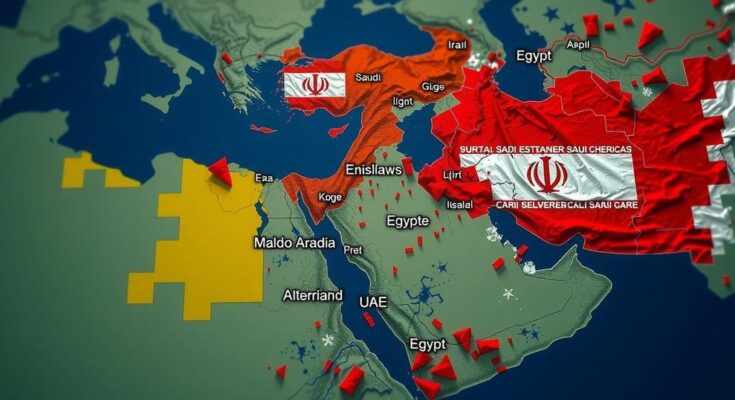Saudi Arabia, the UAE, and Egypt have displayed a notable shift in their responses to Israel’s military actions against Iran, characterized by measured statements emphasizing restraint and regional stability. This evolving diplomatic tone hints at a strategic realignment in the Middle East, where these nations are increasingly viewing Israel as a partner against common threats, particularly Iranian influence. Their nuanced responses reflect a potential departure from previous decades marked by outright condemnations, signaling a complex but gradual rapprochement.
In a complex geopolitical landscape, Saudi Arabia, the United Arab Emirates (UAE), and Egypt have exhibited a nuanced response to Israel’s recent military engagement targeting an Iranian facility. Unlike the traditional condemnations often directed towards Israel, the nations’ reactions were strikingly measured, suggesting a potential shift in their strategic perspectives regarding regional dynamics. The UAE, while formally condemning the military targeting of Iran, encouraged restraint and emphasized the significance of dialogue and adherence to international law. This approach indicates not only a diplomatic inclination toward peaceful resolutions but also a subtle acknowledgment of Israel’s position as a strategic ally, following the Abraham Accords that have fostered economic and security cooperation. Similarly, Saudi Arabia, in its response, characterized the attack as a violation of sovereignty but prioritized the overarching theme of regional security and stability. This marks a departure from the sharper rhetoric of the past, showcasing a strategic calibration that hints at an understanding of the necessity for collaboration against Iranian influence while balancing its own diplomatic ties. Egypt’s reaction further underscores this evolving pragmatism; it warned of serious confrontations threatening regional and international security and called for a swift ceasefire. By adopting a broader focus on regional stability rather than chastising Israel directly, Egypt reflects its longstanding role as a mediator with vested interests in maintaining peace, particularly along its borders. These diplomatic statements, characterized by a lack of direct criticism towards Israel, suggest more than mere rhetorical adjustments—they indicate an overarching strategic realignment within the Middle East. While these nations continue to advocate for the Palestinian cause, their immediate priorities appear to emphasize the necessity to curtail Iranian regional dominance and to promote economic stability alongside security within their territories. The cautious compliments towards Israel’s actions signify a potential shift in perception, where Israel may be viewed increasingly as an ally rather than an adversary in the context of regional security. Whereas previous decades witnessed unified condemnations in response to Israeli military actions, today’s nuanced responses point toward a gradual erosion of historic divides in favor of collaborative interests against a common threat. This phenomenon suggests that Saudi Arabia, the UAE, and Egypt are recognizing the strategic importance of their relations with Israel, potentially paving the way for a more cohesive security architecture in the region.
The Middle Eastern geopolitical landscape has been historically fragmented, dominated by adversarial relations amongst Arab states and Israel, particularly in the aftermath of the Israeli-Palestinian conflict. Tensions are further complicated by Iran’s expanding influence, which poses a shared concern to several Arab nations. In recent years, shifts in diplomatic interactions, including the Abraham Accords, have facilitated a reexamination of relationships, leading to subtler alignments between Israel and certain Arab states. The international climate has evolved, and strategic cooperation against common threats such as Iran has begun to reshape national policies and alliances.
The responses from Saudi Arabia, the UAE, and Egypt regarding Israel’s military actions against Iran reflect a significant evolution in the regional discourse. By prioritizing themes of restraint, dialogue, and regional stability over direct criticism, these nations exhibit an emerging consensus that recognizes the necessity for collaborative approaches to counterbalance Iranian influence. This indicates a potential shift in how Israel is viewed by its Arab neighbors, suggesting that longstanding enmities may be giving way to strategic partnerships rooted in shared security interests.
Original Source: www.jpost.com




